The Essential Role of Body Preservation in Funeral Care
When a loved one passes away, providing dignified care for their physical remains becomes one of our most important responsibilities. At the heart of this care is proper preservation, which is where a funeral home body freezer comes into play.
A funeral home body freezer isn't just a piece of equipment—it's a crucial tool that allows funeral professionals to honor the deceased with respect while giving families the time they need to make arrangements and say goodbye. These specialized refrigeration units are designed specifically to preserve the body in a dignified manner by maintaining precise temperature conditions that slow the natural decomposition process.
Most standard coolers operate between 2°C to 5°C (36°F to 41°F), striking the perfect balance between preservation and maintaining the body's natural appearance. For situations requiring extended storage or forensic purposes, freezer units that reach -10°C to -50°C provide additional protection and preservation capabilities.
| Funeral Home Body Freezer Essentials | Description |
|---|---|
| Standard Temperature Range | 2°C to 5°C (36°F to 41°F) for standard coolers |
| Freezer Temperature Range | -10°C to -50°C for forensic/long-term storage |
| Common Capacities | Single body up to 50+ bodies (walk-in units) |
| Average Cost | $6,095 (2-body) to $9,431 (4-body standard) |
| Key Components | Stainless steel interior, 4-inch insulated panels, digital temperature control, alarm systems |
The importance of proper body preservation extends far beyond the technical aspects. When we care for someone's physical remains, we're honoring their memory and providing comfort to those who are grieving. Modern funeral home body freezers have evolved significantly, offering funeral directors the ability to maintain perfect conditions with digital precision, energy-efficient operation, and safety features like backup power systems that ensure continuous operation even during emergencies.
I've spent over a decade at Mortuary Cooler, supplying refrigeration equipment to funeral homes nationwide. Through this experience, I've seen how the right preservation equipment can transform a funeral home's ability to serve families with compassion and efficiency during their most difficult moments.
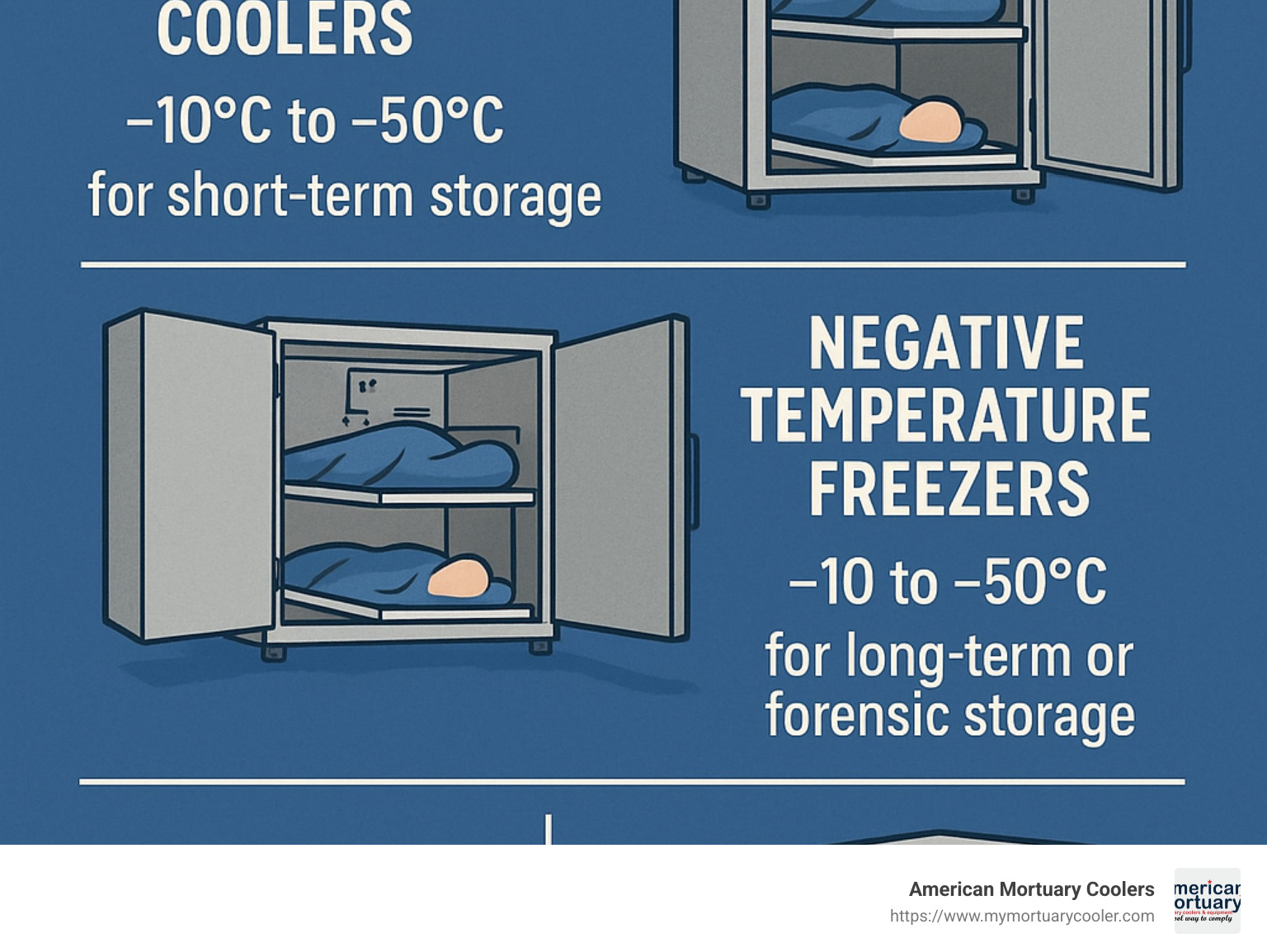
The right funeral home body freezer doesn't just preserve remains—it preserves dignity, provides peace of mind, and allows funeral professionals to focus on supporting families rather than worrying about technical details.
Learn more about funeral home body freezer:
What Is a Funeral Home Body Freezer?
A funeral home body freezer is exactly what it sounds like - specialized equipment that keeps human remains at carefully controlled temperatures. Unlike your kitchen refrigerator, these units are thoughtfully designed with the specific purpose of preserving someone's loved one with dignity and care.
"When families entrust their loved ones to a funeral home, they're placing incredible faith in our ability to provide respectful care," explains our lead designer at American Mortuary Coolers. "Our funeral home body freezers honor that trust by creating a dignified resting place while addressing the practical need for preservation."
These specialized units serve several essential purposes in funeral care. They preserve remains so family members can properly identify their loved ones. They provide the necessary time for relatives to travel from distant locations for viewings and services. When weather or other circumstances delay burial or cremation, these units offer secure temporary housing. In certain cases, they support forensic investigations, and they accommodate the various religious and cultural practices that influence funeral timing.
Scientific research on decomposition rates confirms what funeral professionals already know - proper refrigeration significantly extends the window during which remains can be preserved in a viewable condition. Depending on circumstances and temperature settings, this preservation period typically ranges from several days to weeks.
Funeral Home Body Freezer vs. Alternative Cooling
While professional funeral home body freezers represent the gold standard for body preservation, families sometimes explore alternative cooling methods, particularly for home funerals or green burial practices.
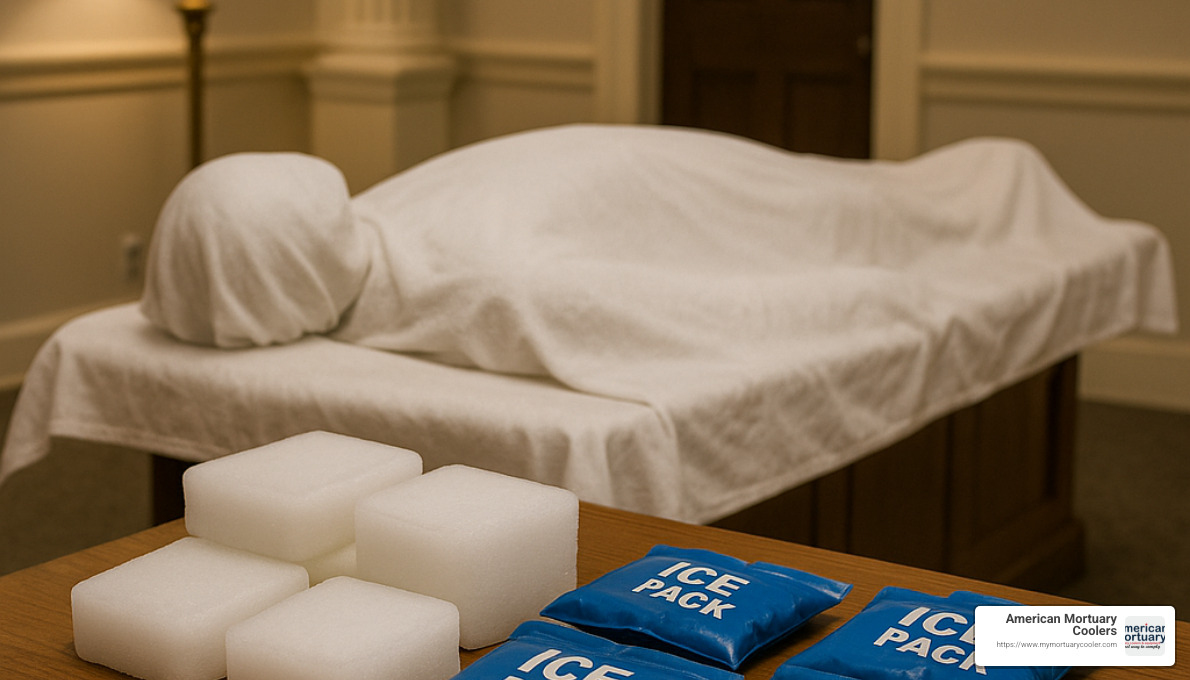
Dry ice offers a temporary solution by placing solid carbon dioxide blocks around the torso. This method typically requires 10-20 pounds initially, with replacement needed every 24 hours. While effective in the short term, dry ice demands careful handling to prevent tissue damage and proper ventilation due to carbon dioxide off-gassing.
Some families use polymer refrigerant packs (similar to what you might find in a high-end cooler) placed strategically around the body. These provide cooling for 3-4 hours before needing replacement or reactivation - making them quite labor-intensive compared to professional equipment.
Home funeral experts acknowledge these alternative cooling techniques can work for brief periods but lack the consistency and reliability of professional funeral home body freezers. They require significantly more hands-on management and constant monitoring, which can add stress during an already difficult time.
Environmental considerations also matter in this choice. Modern funeral home body freezers increasingly use eco-friendly refrigerants like R134A that meet green protection standards, while dry ice production actually creates a substantial carbon footprint - something many environmentally conscious families don't realize.
For more detailed information about different cooling options for funeral homes, you can read our comprehensive guide on types of morgue freezers and their uses.
How Does a Funeral Home Body Freezer Work to Preserve Bodies?
Think about your home refrigerator for a moment. Now imagine a similar cooling process, but engineered specifically for the dignified preservation of loved ones. That's essentially what a funeral home body freezer does, though with much more precision and specialized features.
The magic happens through a carefully designed refrigeration cycle with four main steps:
- The compressor (the heart of the system) pressurizes refrigerant gas, heating it up in the process
- This hot gas travels through condenser coils where it releases heat and becomes liquid
- The liquid refrigerant expands through a valve, rapidly cooling as pressure drops
- Finally, this cold refrigerant absorbs heat from inside the unit before returning to the compressor
At American Mortuary Coolers, we use environmentally responsible R134A refrigerant in our funeral home body freezers. This modern refrigerant efficiently transfers heat while meeting strict environmental standards – something we take pride in as stewards of both our profession and our planet.
The walls of our units feature imported polyurethane foam insulation at a substantial 4-inch thickness. This isn't just about keeping the cold in – it's about creating a stable environment that maintains precise temperatures regardless of external conditions.
"Good insulation is like a good suit – it might not be the flashiest part, but it's absolutely essential for performance," our head engineer often says. Our polyurethane panels provide excellent R-value that keeps temperatures consistent while reducing energy costs for funeral homes.
Modern digital controllers in our funeral home body freezers maintain temperatures with remarkable 0.1°C precision. Many of our models include independent compressors for each chamber – a critical backup system ensuring that if one fails, others continue operating. When you're entrusted with someone's loved one, this kind of reliability isn't optional.
Positive-Temperature Operation (2°C–5°C)
Most standard funeral home body freezers operate between 2°C and 5°C (36°F to 41°F). This "refrigerator-not-freezer" range hits a sweet spot for several important reasons.
This temperature significantly slows bacterial activity and decomposition processes without freezing tissues. Bodies remain in a natural state, which is particularly important for viewings and services where families want their loved one to look peaceful and recognizable.
The positive temperature range also makes the body easier to handle for preparation purposes compared to frozen remains. Embalmers and funeral directors can work more effectively when tissues remain pliable.
From a practical standpoint, this temperature range typically provides a window of several days to weeks for families to make arrangements, gather from distant locations, and hold services. It's the perfect balance between preservation effectiveness and practical considerations like energy usage.
Negative-Temperature Operation (-10°C to ‑50°C)
For specialized situations, negative-temperature funeral home body freezers take preservation to another level. Operating between -10°C and -50°C, these units effectively freeze the remains, which serves several specific purposes.
Medical examiners and forensic facilities often require these colder units when handling complex investigations where evidence preservation is paramount. Research facilities and teaching institutions also use this technology when longer-term storage is necessary.
"Negative temperature units are like the heavy-duty trucks of our industry," explains our technical director. "They require more substantial cooling systems and energy, but they can halt decomposition almost completely by freezing tissues and fluids."
These specialized freezers often come equipped with advanced features like temperature recording and printing systems. This documentation creates an unbroken record of storage conditions – essential for maintaining chain-of-evidence in forensic cases.
The choice between positive and negative temperature funeral home body freezers ultimately depends on the specific needs of the facility and the length of time bodies will need to be preserved. At American Mortuary Coolers, we help funeral homes determine exactly which solution best serves their unique requirements and the families who depend on them.
Major Types of Funeral Home Body Freezers
The funeral industry relies on several distinct types of funeral home body freezers, each thoughtfully designed to address specific needs, space limitations, and capacity requirements. Here at American Mortuary Coolers, we take pride in manufacturing and supplying all major varieties to serve funeral homes of every size across the nation.
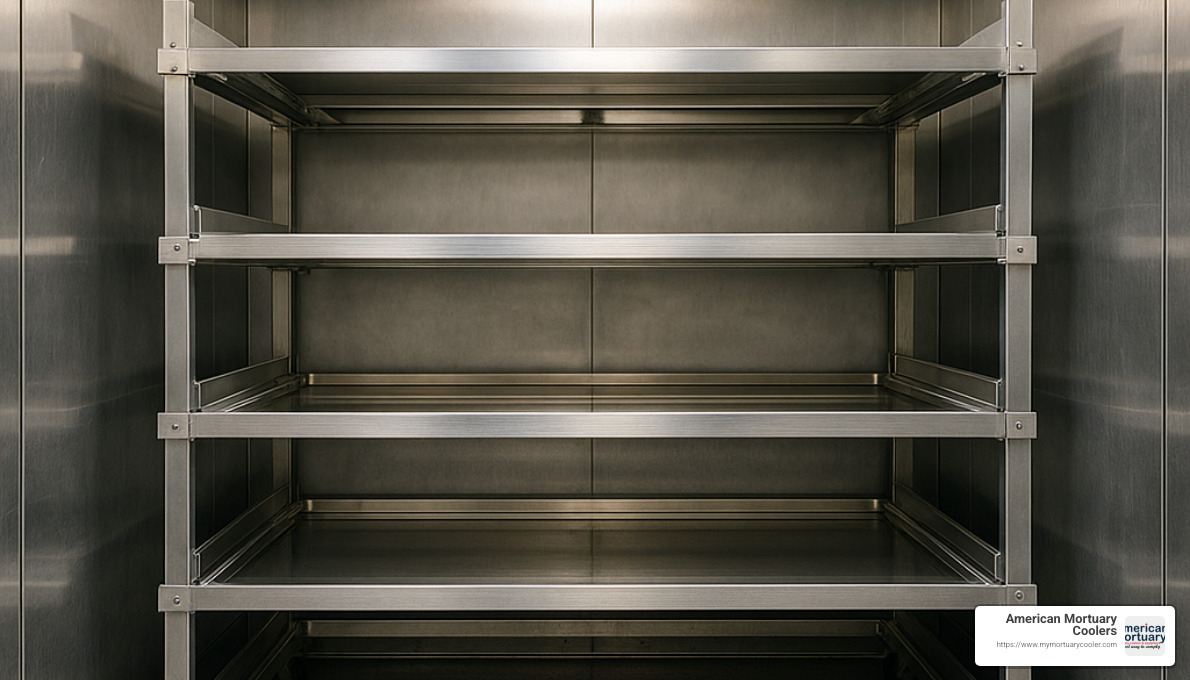
Body Box Funeral Home Body Freezer
Body box funeral home body freezers (sometimes affectionately called mini mortuary coolers) offer the most compact and budget-friendly solution for many facilities. These practical units feature drawer-style access that allows staff to retrieve a specific individual without exposing others to ambient temperatures.
"Body boxes are perfect for facilities with limited space or those handling a moderate caseload," explains our sales team. "They provide all the essential preservation capabilities in a compact package that won't overwhelm your available space."
These units typically accommodate 2 to 9 bodies depending on the configuration you choose. With their stainless steel construction, they're built for both durability and easy sanitation – two critical factors in mortuary care. Since they're self-contained, they simply plug into standard electrical outlets without requiring complex installation.
Cost-wise, a standard 4-body mortuary cooler box runs approximately $9,049 to $9,431, while our more compact 2-body models start around $6,095, making them accessible options for smaller funeral homes or those just starting out.
If you're considering which body box might be right for your facility, our detailed guide on Types of Morgue Freezers and Their Uses can help you understand all the available options.
Upright Funeral Home Body Freezer
When floor space is at a premium but you have adequate ceiling height, upright funeral home body freezers offer an neat solution. These vertical units typically hold 1-6 bodies while minimizing their footprint in your facility.
What makes our upright models particularly staff-friendly is their telescoping slide rails, which significantly reduce the physical strain of transferring remains. Your team's safety matters, and these thoughtful features can prevent workplace injuries while providing dignified handling.
"Our 3-body upright model has become a favorite for rural county morgues, hospitals, removal companies, and smaller funeral homes," shares our product specialist. "We can add optional castors for mobility, and these units require no external drainage system – just wheel it in, plug it into a standard 110V outlet, and you're ready to go."
With both side-loading and front-loading configurations available, we can customize these units to work within your specific space constraints while providing the clear digital temperature displays and control systems that ensure proper preservation.
Walk-In Funeral Home Body Freezer
For larger operations or facilities that experience high volume, walk-in funeral home body freezers represent the gold standard in capacity and efficiency. These customizable spaces can accommodate anywhere from 5 to 50+ bodies depending on the dimensions and rack configuration you choose.
We construct these units using modular 4-inch thick insulated panels that allow us to create a custom solution for virtually any available space. The panelized construction also means your walk-in unit can grow with your business – something many of our clients appreciate as their needs evolve.
Inside, you can choose between cantilever storage racks or comprehensive mortuary rack systems to optimize your capacity. While walk-in units require a greater initial investment, they offer the lowest cost-per-body when operating at or near capacity, making them economically sound for busy facilities.
Rest assured that all our walk-in solutions comply with the Federal Energy Independence & Security Act of 2007 (EISA Title III, Section 312) while providing the durable, efficient operation you expect from American Mortuary Coolers.
Mobile & Rental Units
Life doesn't always follow a predictable schedule, and neither do the needs of those in funeral care. For temporary demands or emergency situations, mobile and rental funeral home body freezers provide the flexibility to respond to unexpected circumstances.
"Mobile units proved absolutely invaluable during the COVID-19 pandemic," recalls our operations manager with a solemn nod. "We supplied temporary refrigeration solutions to hospitals and funeral homes facing unprecedented demand – it was challenging work, but essential during that difficult time."
These units come in various capacities from single-body to multi-body configurations and are designed for rapid deployment during mass casualty events or seasonal demand spikes. They require minimal site preparation and feature transportable designs for field operations when needed.
For those who prefer not to make a capital investment for occasional overflow situations, companies like Polar Leasing offer mortuary coolers and freezers for temporary cold storage needs. This can be a practical solution for managing unexpected volume without committing to permanent equipment.
Key Features, Components, and Compliance Standards
When it comes to funeral home body freezers, it's not just about keeping things cold. Modern units combine thoughtful engineering with careful attention to regulatory requirements, creating equipment that's both practical and respectful.
At American Mortuary Coolers, we've spent years perfecting the balance between technical excellence and compassionate design. Let me walk you through what makes these specialized units different from ordinary refrigeration.
Core Components of Quality Funeral Home Body Freezers
The heart of any quality funeral home body freezer starts with stainless steel construction. Most of our units use SS201 standard stainless for the interior and exterior surfaces, with SS304 available for those wanting extra durability. This isn't just about looking professional – stainless resists corrosion, cleans easily, and maintains its integrity year after year.
Those thick 4-inch panels you'll notice aren't just for show. They're filled with high-density polyurethane foam that creates an impressive thermal barrier. Think of it as a temperature fortress that keeps the cold in and the heat out, while keeping your energy bills manageable.
"The difference between standard insulation and our 4-inch panels is like comparing a windbreaker to a winter coat," explains our lead engineer. "When you're preserving something as important as human remains, that extra protection matters."
Digital temperature controls have revolutionized the industry. Our systems maintain temperatures within a tenth of a degree, displaying current conditions on easy-to-read screens. This precision would have seemed like science fiction just a few decades ago.
Safety doesn't happen by accident. That's why we incorporate triple alarm systems (buzzer, flash, and remote) to alert staff immediately if anything goes wrong – whether it's a temperature deviation, sensor failure, door left ajar, or power issue.
Speaking of power issues, built-in lithium batteries support temperature displays and alarms for up to 72 hours during outages, with optional UPS systems available for facilities in areas with unreliable electricity.
Many of our funeral home body freezers feature independent refrigeration systems for each chamber, ensuring that a problem in one section doesn't affect others – a small detail that can make a huge difference during challenging times.
The lighting inside might seem like a minor consideration, but our UL-approved LED systems provide clear illumination without generating heat or creating moisture concerns – practical considerations that matter when you're working with the deceased.
Safety door mechanisms include features like emergency release handles, magnetic gaskets for proper sealing, and lockable latches that balance security with safety.
Compliance with Industry Standards
Meeting regulatory requirements isn't optional in our industry. Quality funeral home body freezers must satisfy numerous standards, including NSF certification (confirming food-grade sanitation standards), OSHA compliance (ensuring worker safety), EISA compliance (meeting federal energy efficiency standards), UL approval (verifying electrical safety), and ASTM E84 testing (confirming panels meet flame spread standards).
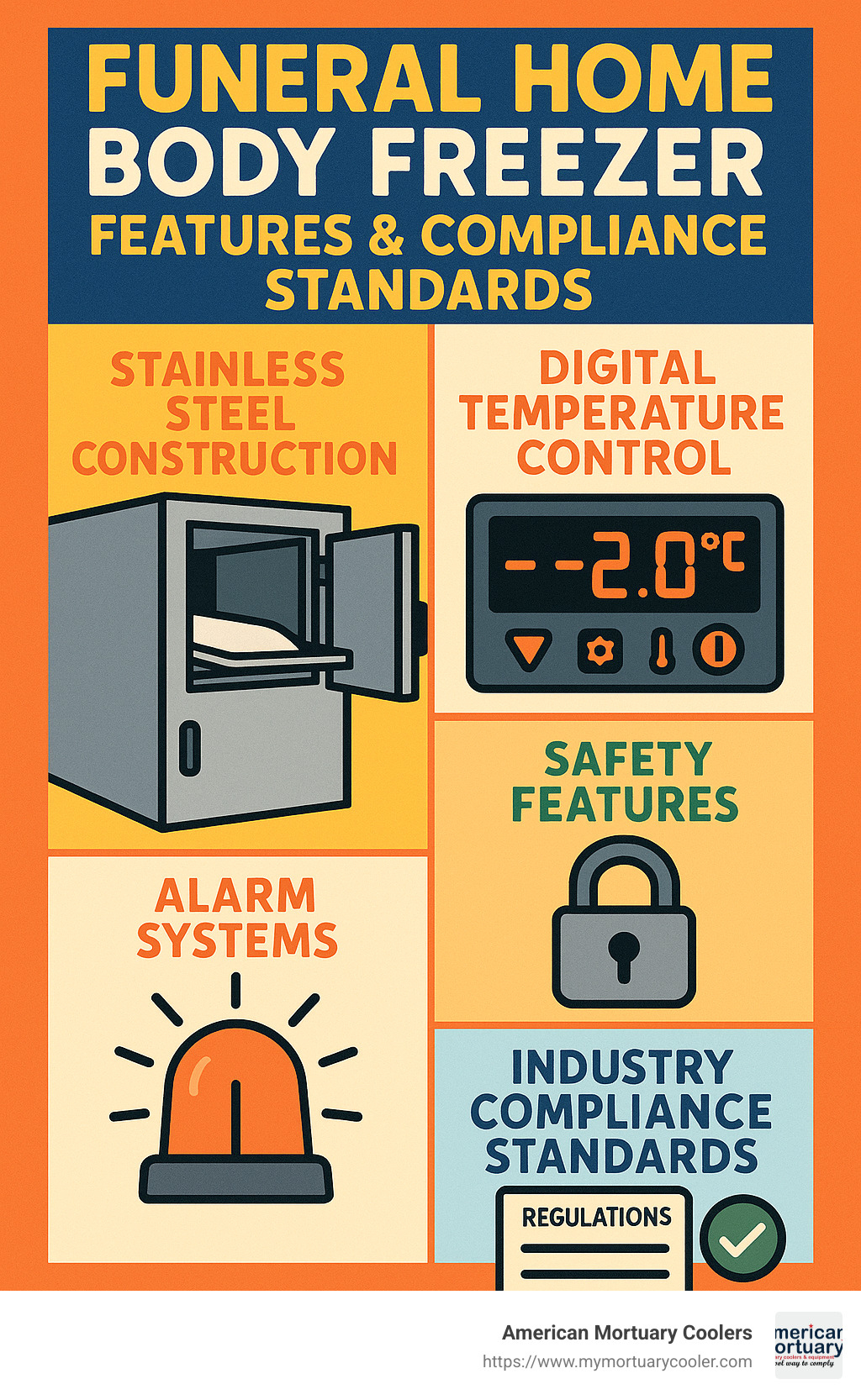
Capacity & Configuration Options in a Funeral Home Body Freezer
Finding the right size funeral home body freezer is crucial for operational efficiency. Single-body units offer compact solutions for smaller facilities, while 2-body configurations come in various designs to fit different spaces. Medium-sized operations often opt for 3-body or 4-body options, with standard and extra-wide versions available.
Larger facilities might need 6-body, 8-body, or even 12-body models. For the highest volume needs, walk-in configurations can accommodate anywhere from 5 to 50+ bodies with specialized rack systems.
"Think about your busiest week, not your average one," suggests our design consultant. "The configuration you choose should accommodate your peak periods, not just your typical caseload."
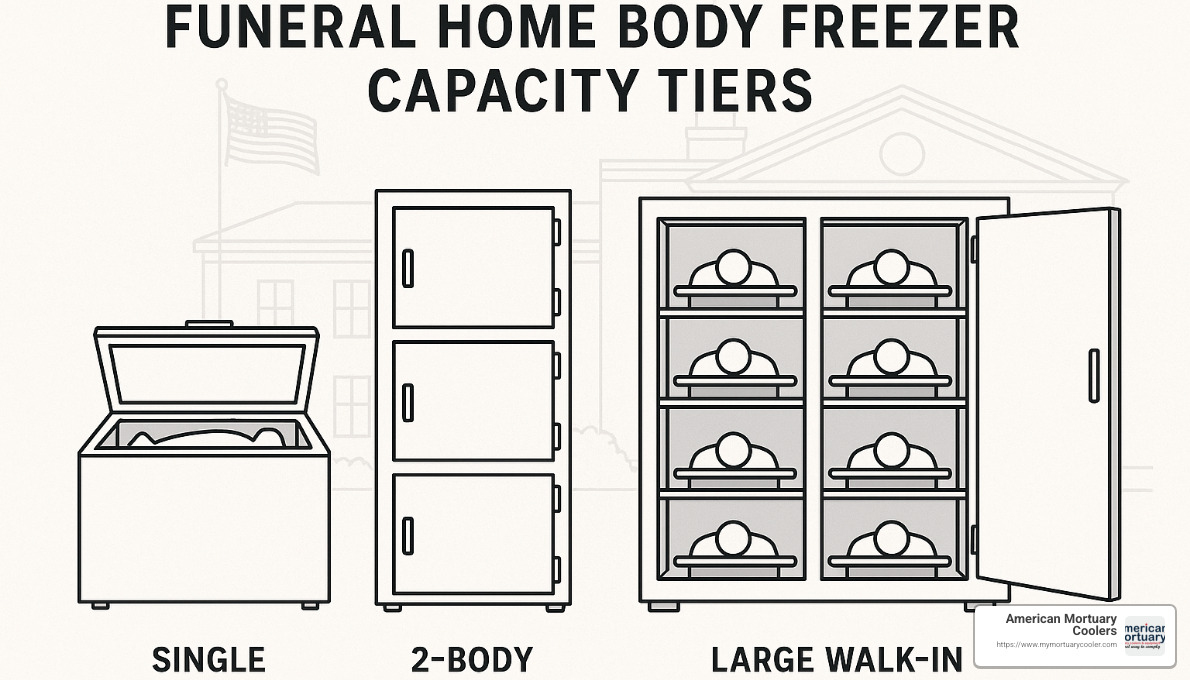
Hygiene, Safety & Redundancy
When handling human remains, cleanliness isn't just a preference – it's an absolute necessity. That's why quality funeral home body freezers feature seamless interior design that eliminates hiding spots for bacteria. Non-porous surfaces prevent fluid absorption and make thorough cleaning straightforward.
Some facilities opt for anti-microbial finishes that provide an extra layer of protection against bacterial growth. Removable stainless steel trays with rollers allow for easy cleaning, while prefabricated interior corners with rounded edges prevent debris accumulation that could compromise hygiene.
Door water-stop belts might sound technical, but they serve a crucial purpose – preventing leakage and cross-contamination between chambers. It's a small detail that shows respect for each individual in your care.
Safety systems in modern units go far beyond the basics. Triple alarm systems combine audible buzzers, visual flashes, and remote notifications to ensure staff awareness of any issues. Seven distinct safety alarms monitor conditions ranging from temperature fluctuations to door openings.
Built-in temperature recording systems document conditions continuously – not just for compliance, but for quality assurance. Lithium battery backups maintain critical monitoring during power outages, while independent cooling systems ensure continued operation even if one compressor decides to take a day off.
"These redundancies aren't just about checking boxes," our safety officer often reminds clients. "They're about honoring your commitment to families by ensuring their loved ones receive consistent, dignified care – even when things don't go as planned."
Regulatory Checklist
Navigating regulations can feel overwhelming, but a compliant funeral home body freezer helps meet these requirements with confidence. Local health department codes vary by jurisdiction but typically specify minimum cooling requirements that our units exceed. CDC guidelines provide recommendations for handling deceased individuals that inform our design process.
Crematory rules may include specific cooling requirements prior to cremation, while OSHA standards address worker safety around refrigeration equipment. Energy efficiency regulations, including EISA compliance for walk-in units, continue to evolve, and our engineering team stays ahead of these changes.
Documentation requirements for temperature logs and maintenance records are simplified with our digital systems, providing peace of mind for funeral directors navigating complex compliance landscapes.
At American Mortuary Coolers, we ensure all our funeral home body freezers meet or exceed applicable regulations. Because when you're caring for families during their most difficult moments, the last thing you need is regulatory concerns.
Selecting the Right Funeral Home Body Freezer: Factors & Costs
Choosing the perfect funeral home body freezer isn't just about finding equipment—it's about finding a partner in your commitment to dignified care. Let me walk you through what matters most when making this important decision.
When funeral directors call me, they're often surprised by how many factors go into selecting the right unit. It's not just about size and price—though those certainly matter!
Space is always the first consideration. I remember visiting a historic funeral home in New Orleans that had beautiful facilities but challenging layout constraints. We measured not just where the unit would sit, but also accounted for door clearance, ventilation needs, and staff movement patterns. For them, an upright model provided the perfect solution, maximizing capacity while respecting their limited square footage.
Your case volume should guide your capacity decisions. Look at your busiest months, not just your average. I generally recommend selecting a capacity that handles your peak periods plus an extra 20% buffer for unexpected situations. Nothing creates more stress than reaching capacity during a difficult week.
Budget considerations extend beyond the initial purchase. Our funeral home body freezers typically range from $6,095 for a basic 2-body box up to $32,995 for larger 8-body telescoping slide-rail coolers. But a wise funeral director also considers installation costs, energy consumption, maintenance requirements, and expected lifespan (our units typically serve 15+ years). The warranty coverage can make a significant difference in your long-term satisfaction too.
Energy efficiency might seem boring until you see your utility bills! Higher R-value insulation costs more upfront but saves significantly over time. If your funeral home operates in Phoenix or Miami, you'll face higher cooling demands than operations in cooler climates. Our EISA-compliant units offer better efficiency that pays dividends year after year.
Do you anticipate needing to move your unit? Some funeral homes select models with castors for flexibility, while others prefer knock-down designs that can be disassembled and reassembled when needed. Units requiring no external drainage connections and standard 110V electrical supply offer the most placement flexibility.
At American Mortuary Coolers, we specialize in customized solutions. Whether you're working with unusual space configurations, special capacity requirements, or aesthetic considerations (we offer PMS color matching at no extra cost), we can help create the perfect solution for your unique needs.
Optional Accessories & Upgrades
The right accessories can transform a good funeral home body freezer into a great one. LED cabinet lighting provides improved visibility with minimal heat generation—a small upgrade that staff appreciate daily. Drainage systems make cleaning and fluid management much simpler, while premium SECOP (formerly Danfoss) compressors offer improved reliability for peace of mind.
I've seen how valuable UPS backup systems can be during severe weather events, ensuring continued operation when power fails. Digital door thermometers allow temperature monitoring without opening doors, improving both energy efficiency and temperature stability. And for roll-in units, exterior ramps facilitate smooth transfers that protect both remains and staff from injury.
Cultural & Religious Considerations
Different communities have unique needs regarding care for the deceased. Some traditions involve extended viewing periods requiring reliable long-term refrigeration, while others mandate burial within 24 hours. Certain faiths perform ritual washing, potentially necessitating specialized preparation areas near coolers.
I recall working with a funeral home serving a large Muslim community. Their funeral home body freezer needed to accommodate rapid burial requirements while providing privacy and space for family members participating in preparation. We designed a solution with separated cooling chambers and more accessible layouts that respected these important traditions.
Latest Innovations & Trends
The mortuary refrigeration industry continues evolving with exciting new technologies. IoT monitoring now allows remote temperature tracking via smartphone apps—providing peace of mind even when you're away from the facility. Many funeral directors tell me this feature alone has improved their sleep quality!
Green refrigerants with lower environmental impact are becoming standard, while solar backup systems offer renewable energy options for power redundancy. Seamless fiberglass construction improves both sanitation and durability, and our PMS color matching ensures your funeral home body freezer blends seamlessly with your facility's aesthetics.
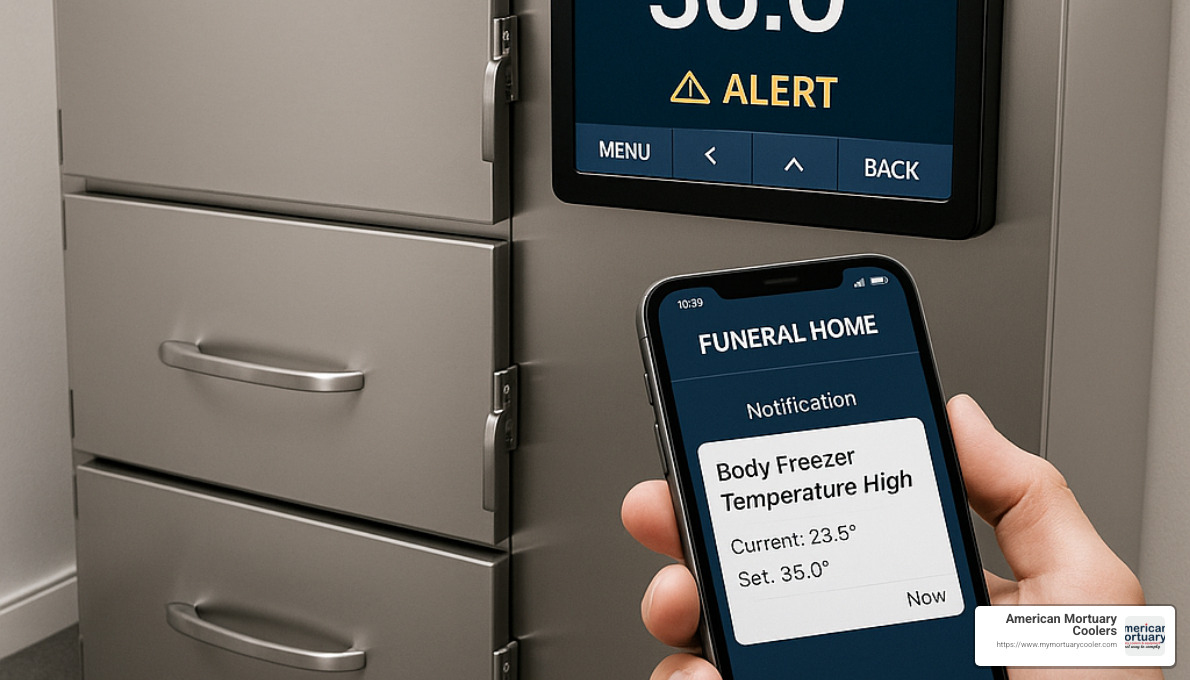
Energy management systems with smart controls optimize power consumption, reducing both environmental impact and operating costs. And for those particularly concerned with infection control, antimicrobial surface treatments provide an additional layer of protection.
For a comprehensive evaluation tool to help guide your decision, I recommend our Ultimate Checklist for Finding a Mortuary Freezer Near Me. It walks through all these considerations in a practical, step-by-step format.
Selecting the right funeral home body freezer isn't just about technical specifications—it's about finding equipment that supports your commitment to dignified, respectful care during life's most difficult moments.
Frequently Asked Questions about Funeral Home Body Freezers
How many days can a body stay in a funeral home body freezer?
When families ask me this question, I explain that in a properly maintained funeral home body freezer operating at 2°C to 5°C, their loved one can typically be preserved for 3-4 weeks while maintaining a viewable condition. That said, several factors influence this timeframe.
The body's condition before refrigeration plays a significant role—as does whether embalming was performed, which can extend preservation considerably. The consistency of temperature maintenance matters greatly, and individual biological factors and prior medical treatments can affect preservation timelines too.
"We always remind funeral directors that refrigeration works best as a short to medium-term solution," our technical advisor often tells clients. "While our funeral home body freezers provide excellent preservation, they work alongside rather than replace traditional preparation methods for the best possible outcome."
For situations requiring much longer storage, our negative-temperature freezers operating between -10°C and -50°C can preserve remains for months or even years. These specialized units are primarily used in forensic investigations or research settings rather than typical funeral services.
What temperature should a funeral home body freezer be set at?
The ideal temperature for a standard funeral home body freezer falls between 2°C and 5°C (36°F to 41°F). We've found this range strikes the perfect balance for several important reasons.
This temperature significantly slows bacterial growth and decomposition while avoiding tissue freezing that could cause cellular damage. It keeps the body in a condition appropriate for viewing and preparation, maintains energy efficiency, and meets health regulations in most locations across the country.
For those rare situations requiring extended preservation or forensic applications, our negative-temperature models operate between -10°C and -50°C, which effectively freezes the remains.
I'm particularly proud of the digital temperature controllers in our modern units. They allow for precise setting and monitoring, with our premium models maintaining accuracy within ±0.1°C of your target temperature—giving you one less thing to worry about during difficult times.
Can a funeral home body freezer be expanded later?
Yes! Many of our clients start with a smaller system and expand as their needs grow. We've designed our funeral home body freezers with this flexibility in mind.
For our popular body box units, you can easily place additional matching units side-by-side as your needs increase. Many funeral directors appreciate our modular designs specifically created for seamless expansion. Just remember to plan your electrical systems with potential growth in mind—something our installation team can help with during initial setup.
Our walk-in coolers offer even more expansion possibilities. Thanks to their modular panel construction, you can often enlarge the cooler itself if space allows. Even without physical expansion, additional rack systems can increase capacity within your existing footprint, though refrigeration systems might need upgrading to handle the larger volume.
"When helping funeral homes design their facilities, we always recommend thinking about future growth," says our planning consultant at American Mortuary Coolers. "Setting aside adequate space and planning electrical capacity for potential expansion can save you thousands down the road."
The expansion options do vary between different models, which is why we take time to understand not just your current needs but your long-term plans. Our custom-built units can include thoughtful features like removable panels on specific walls or pre-sized refrigeration systems with extra capacity built in from the start—making future growth much simpler and more cost-effective.
Conclusion
The funeral home body freezer represents far more than just a piece of equipment—it's a critical investment that helps funeral professionals fulfill their sacred duty of caring for the deceased with dignity and respect. Throughout this guide, we've seen how these specialized refrigeration units form the backbone of modern funeral service operations.
Here at American Mortuary Coolers, we've spent years working alongside funeral directors across the country. We've learned that choosing the right funeral home body freezer isn't just about technical specifications—it's about finding a solution that aligns with your unique facility, clientele, and vision for service.
Our nationwide presence means we're never far away, whether you're operating in the humid heat of Florida, the dry climate of Arizona, or the variable conditions of the Midwest. From New York to Los Angeles and Chicago to Dallas, we're proud to support funeral homes throughout the contiguous 48 states with personalized consultation and responsive service.
The funeral profession continues to evolve in meaningful ways. Families have new expectations, regulations become more complex, and technology offers both challenges and opportunities. Modern funeral home body freezers reflect these changes through advanced monitoring systems, improved energy efficiency, and adaptable configurations that accommodate diverse cultural and religious needs.
"What we hear most often from our customers isn't just about the technical reliability of our coolers," shares our company president. "It's about the peace of mind that comes from knowing they have equipment they can depend on during emotionally challenging times—when families are counting on them most."
Whether you're just starting out with your first facility, replacing aging equipment that's seen better days, or expanding to meet the needs of a growing community, we're here to help create custom solutions custom to your specific requirements. We take pride in our American-made, custom-designed funeral home body freezers that blend technical excellence with the respectful care your families deserve.
The right refrigeration solution does more than preserve—it can transform your operations, reduce your stress levels, and help you focus on what matters most: supporting families through difficult times. Our commitment to quality construction and energy efficiency has made us a trusted partner to funeral professionals who refuse to compromise on standards of care.
For more information about our leading funeral home body freezers and our comprehensive service approach, we invite you to explore our American Mortuary Coolers: The Leading Supplier of Morgue Coolers, Funeral Home Coolers, and Forensic Refrigeration Solutions resource page.
We'd love to start a conversation about how we can support your specific needs. After all, in this profession, details matter—and we're here to get them right.



















